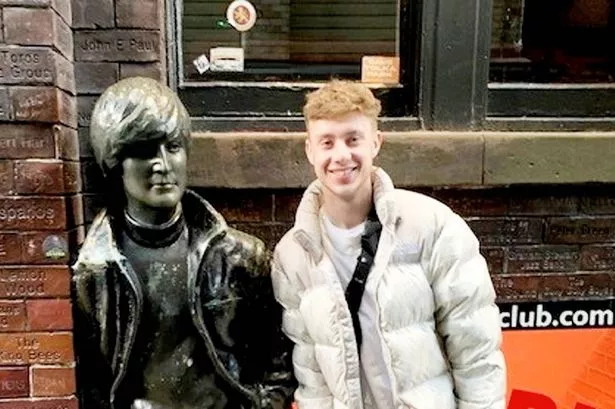
Levi Dewey, 20, was left in an induced coma with just a 30 per cent chance of survival after being struck down with the life-threatening condition
A young man, who was fit and healthy, had to have both his legs amputated just days before his 21st birthday after what seemed like flu symptoms turned out to be sepsis.
Levi Dewey found himself in an induced coma with a mere 30% chance of survival after being diagnosed with the life-threatening condition.
The active 20 year old, who enjoyed playing football, initially fell ill with flu-like symptoms and started taking over-the-counter medications. However, when his condition didn’t improve, his mother Lara took him to hospital, guided by her maternal instincts.
Read more: Amazon Prime Day 2025 – all you need to know
The former JCB welder then went into septic shock and suffered multiple organ failure at Royal Derby Hospital. Doctors discovered he was suffering from pneumococcal pneumonia and sepsis, leading to his transfer to Leicester’s Glenfield Hospital for specialist treatment.
Levi’s parents, Lara and Neil, were informed that their son would need surgery to amputate both legs below the knee – an operation he underwent two days before his 21st birthday. Upon waking up, Levi expressed his gratitude for being alive but acknowledged that ‘nothing could prepare him for how much his life would change.
Levi, from Willington, Derbyshire, said: “I woke up and Christmas had passed, it was like my life was flipped upside down.
“I was relying on my family to tell me what had happened, it was such a blur.
“It was really difficult because I nearly died and I am so grateful to be here but I had to wrap my head around spending the rest of my life without my legs.”
Levi revealed his recovery proved challenging to accept – grappling with both the psychological impact and the physical transformation that followed.
He explained: “When I got home, it didn’t really feel like home because I was stuck living in my front room.
“I couldn’t get changed by myself or even sit up and because I lost my feet I had to relearn how to drive again with my hands.
“It is those things people can’t really understand.
“I am so lucky to have amazing support and I am so thankful that I am here, but getting sepsis has completely changed my life.”
His parents revealed they initially rushed him to hospital in December 2022 after becoming worried about his “quick and shallow” breathing.
Levi’s mum Lara explained: “I don’t know if it was mum’s intuition, but his breathing wasn’t right.
“He was dosed up on cold and flu tablets but he had a high temperature that wasn’t cooling and he was really drowsy, with no appetite.
“He just wasn’t my Levi.”
Following being placed into an induced coma, Levi, now 23, received Extracorporeal Membrane Oxygenation treatment at Glenfield Hospital in Leicester.
The procedure involved circulating blood outside the body through an artificial lung, where carbon dioxide is extracted and oxygen is introduced, before the oxygenated blood is returned to the body.
Lara remembered: “It all happened so quickly.
“We were told to get home and get some rest and then we got a phone call telling us we needed to get there quickly because he was deteriorating.
“We rushed to be with him and that’s when they told us they didn’t know if he was going to make it through the night.
“He had a 30 per cent chance of survival. It was horrific.”
Lara and Neil confessed their understanding of sepsis was minimal, expressing shock upon learning that Levi’s organs were beginning to fail due to the condition.
Lara admitted: “We had no idea what sepsis was at that point or how bad it could be.
“I thought it was something that only affected older people, or something you got from a cut, so when I saw him in the hospital bed and he was a mottled colour and his legs were blue, you could see where the sepsis had got hold of him.
“I’d never seen anything like it in my life.”
Neil chimed in: “Sepsis is actually quite common but we didn’t know much about it before it affected Levi.
“What we have learned is that sepsis affects younger people differently to older people.
“With older people, because their immune systems are more vulnerable you can see the symptoms more easily, but because Levi was fit and healthy, his immune system was masking his symptoms until it got to a point where his body could no longer cope and he deteriorated rapidly.
“Please familiarise yourself with the symptoms so you know what to look out for.”
Dr Alina Paunescu, emergency medicine consultant and trust sepsis clinical lead at University Hospitals of Derby and Burton NHS Foundation Trust.
She said: “Sepsis affects people of all ages, although very young children and elderly patients are more at risk of developing sepsis after an infection, due to insufficiently developed or compromised immune system.
“Sadly, Levi’s story is not unusual. As sepsis is caused by a dysregulated response to infection, it is not rare for young patients to develop sepsis.
Breaking news straight to your WhatsApp
BirminghamLive readers get the very latest breaking news through our WhatsApp community.
All you have to do is click this link and select ‘Join Chat’ and you are in.
We also treat our community members to special offers, promotions, and adverts from us and our partners. If you don’t like our community, you can check out any time you like by selecting ‘exit group’.
CLICK HERE TO JOIN
“This may occur if they contract an aggressive virus or bacteria, they receive inappropriate antibiotics for what initially appears to be a minor infection, or have underlying conditions that compromise their immune system, so it is important to know what signs to look out for and when to seek medical help.”
Sepsis represents a potentially fatal bodily reaction to infection that develops when the immune system goes into overdrive responding to that infection and starts attacking the body’s own tissues and organs.
Warning signs include: disorientation, intense shaking or acute muscle discomfort, serious difficulty breathing, failure to urinate (over 18 hours or an entire day), blue, grey, pale or patchy skin, lips or tongue and/or light-headedness.





